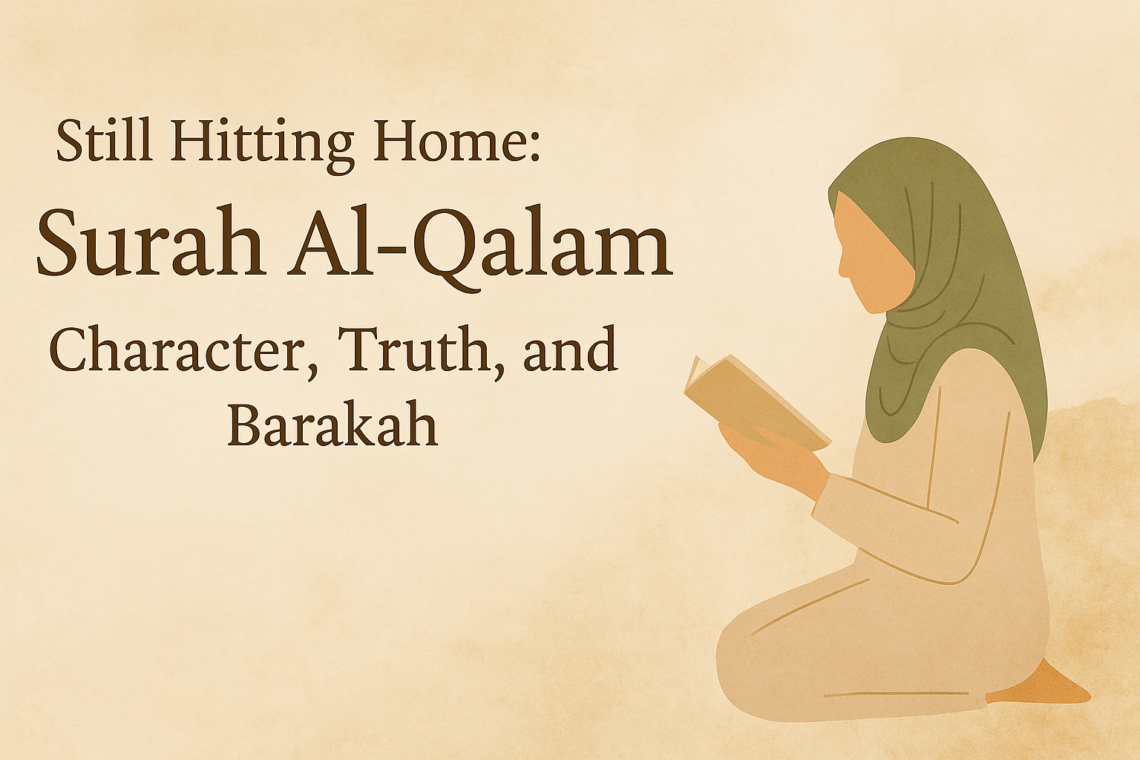
5 Powerful Life Lessons from Surah Al-Qalam Tafseer That Will Challenge How You See Success
Qur’an reflections on character, truth, and barakah
Bismillah…
While some chapters of the Qur’an shake the heart, others quietly expose our blind spots.
Surah Al-Qalam offers both— shakes the heart and exposes our blindspots, through striking imagery, timeless warnings, and deep reflections for the one who wants to live with taqwa. In this Surah Al-Qalam Tafseer, we uncover how faith remains firm even when compromise feels easier.
Why Surah Al-Qalam Tafseer Matters Today
In a world where truth is often blurred and character can feel optional, what do you do?
When silence feels easier than truth, and success doesn’t always align with sincerity?
Maybe you’ve felt it too—that moment when your heart wanted to speak, but your voice held back. Or when admiration for someone’s success clashed with what you believe deep down.
Surah Al-Qalam Tafseer speaks into that space.
It reminds us that integrity, sincerity, and barakah still matter. Its verses expose toxic traits, spotlight spiritual strength, and affirm that success without values is a trap.
These lessons aren’t ancient—they’re timeless.
Compromise vs. Conviction –The Profile of the Corrupt Influencer
(Verses 8–16)
The Prophet ﷺ was pressured by the deniers to meet in the middle—to compromise. But Allah firmly tells him not to give in.
Instead, the Qur’an draws a disturbing character profile of those pushing this agenda: people who lie, slander, gossip, are stingy with good, full of arrogance, and reject truth when it doesn’t serve them.
These verses don’t just call out a person of the past. They sketch a timeless warning—of those who may appear successful or persuasive, yet carry traits that rot the soul.
We’re reminded not to be dazzled by wealth or social power when it masks dishonesty and moral decay.
Reflection:
We live in a world where personality often outshines principles. But the Qur’an flips that script.
True strength is in holding the line. In staying rooted in conviction—especially when the “middle ground” feels tempting.
The Garden That Withered Overnight – A Parable of Greed
(Verses 17–33)
This parable tells of a group of wealthy people who were blessed with a fruitful garden.
But instead of sharing as they were supposed to, they secretly plotted to harvest everything—cutting out the needy and ignoring their duty of giving.
When they arrived, their garden had already been destroyed—wiped out overnight by Allah.
One of them recognized the mistake and called it out, but the lesson had already landed:
Wealth is not a reward for personal brilliance. It’s a trust. And betraying that trust has consequences.
Reflection:
We can work hard. Plan smart. Hustle with all our might.
But if we block others from what’s rightfully theirs, even our best harvest can vanish overnight.
Barakah(divine blessing) doesn’t live in greed—it thrives in gratitude and giving.
Taqwa vs. Arrogance – Why These Two Paths Can’t End the Same
(Verses 34–41)
Allah draws a sharp contrast in these verses—between those who live with taqwa, and those who mock the unseen and demand proof before belief.
A God-fearing person walks with humility and trust in what they can’t always see.
The arrogant? They scoff at accountability, act like they’re above consequence, and treat truth as a challenge—not a compass.
Allah calls out their flawed logic—and makes it clear:
These two lives, though they may run side by side in dunya, can never have the same ending.
Reflection:
Taqwa (piety) isn’t loud—but it’s powerful.
And arrogance may look confident—but it collapses the moment truth asks for evidence.
One walks toward light. The other walks into delusion.
When False Piety Freezes – A Gut Check on Sincerity
(Verses 42–45)
On the Day of Judgment, Allah will reveal Himself.
The true believers will fall into sujood without hesitation—their hearts and bodies aligned in sincerity.
But those who faked submission in dunya? They won’t be able to bow. Their backs will stiffen. Their false piety, their performance of faith—it’ll all be exposed.
This moment will be one of great humiliation for the hypocrites.
A silent unveiling of what was always hidden: the difference between habit and heartfelt devotion.
Reflection:
It’s a gut check.
Are we bowing now out of love—or out of routine?
On that Day, only sincerity will stand. Pretending won’t bend your back.
Patience, Not Applause – Reflections for Every Da’ee (caller to Allah) in Surah Al-Qalam Tafseer
(Verses 46–52)
In these final verses, the Prophet ﷺ is reminded to stay patient—and not to be like Yunus عليه السلام, who left his people in distress before being given permission by Allah.
It’s a gentle but firm nudge: the work of da’wah is not about instant results or recognition. It’s about staying rooted in purpose, even when misunderstood.
The relationship between the da’ee and their audience is delicate. A true caller to Allah must remain graceful, even in the face of criticism, rejection, or mockery.
And to close it all, Allah reminds us: this Qur’an is not madness. It’s a divine message to the entire world.
Reflection:
Grace isn’t weakness. And patience doesn’t mean passivity.
A da’ee walks a hard road—but the path is lit by purpose.
And in a world chasing applause, staying sincere might just be the most radical thing you can do.
A Du’a to Seal It With
اللهم اجعلنا من الذين يستمعون القول فيتبعون أحسنه
O Allah, make us among those who listen to the words of guidance and follow the best of it.

Need tools to reflect and grow?
Visit my Barakah Picks Collection for soulful resources—reflection journals, du’a cards, and intentional living gems.
One Last Thought
“Success is not in how much you have, but in how you share it and what you intend. In other words, material success without sincerity or generosity has no barakah.”
Encrypted Muslimah



One Comment
Pingback: